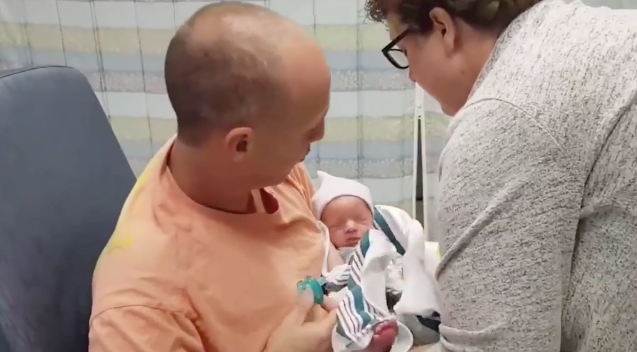
When Michele Hall of Naples, Florida, was told she'd officially entered menopause in 2017, she assumed she could no longer get pregnant. At the time, the news didn't shock her — after all, at 50 years old, she had already welcomed four kids of her own and two grandkids.
But the news that came just a few months later — that she was pregnant and having a baby boy — was another story entirely.
According to Naples Daily News, Michele says she was shocked by the news, and wondered how she could have missed the signs.
The outlet reports that she didn't experience any of the usual telltale pregnancy symptoms, like morning sickness or weight gain, which would have tipped her off. And while there were some aches and pains that came and went, she had chalked them up to either menopause or the side effects of lupus, which she's been managing for the last 10 years.
It wasn't until a sneaking suspicion caused Michele to pick up a pregnancy test that the mom-to-be learned her symptoms were from something else entirely.
Once a doctor confirmed the news, Michele and her husband Jerry, 47, suddenly had just two months to prepare for the birth of their son.
Can you imagine discovering that you're 26 weeks pregnant, and barely having two months to prepare? Add in the fact that you totally thought you were done having kids over a decade ago and, well, let's just say there are a whole lot of emotions you're probably gonna need to process.
Michele told NDN that after the initial shock wore off, she was overcome with fear and anxiety for the future. Between her age and her lupus, she was automatically categorized as a high-risk, "geriatric" pregnancy, and was scheduled for a C-section.
In the weeks that followed, Michele took extra-good care of herself, went to doctor's appointments to monitor progress, and started getting excited.
Of course, there was a little bit of embarrassment and awkwardness that apparently comes with the territory when you're a pregnant woman in your 50s.
"A lot of older people would look at me and do a double take because they were probably trying to figure out if I was as old as they thought I was,” Michele told NDN. But once the news spread among her friends and family, so did the joy.
"A baby signals a new beginning," shared Michele, who has three grown children from a previous relationship and a 14-year-old daughter with Jerry.
Baby Grayson finally arrived on December 27, 2018, and was welcomed with open arms by his parents.
However, the baby's first days were stressful ones for the Halls. Doctors estimate his age at birth to have been between 34 and 35 weeks, which made him slightly younger than full-term. Weighing just over 6 lbs., he was kept under close monitoring in the NICU, due to complications from a sleep apnea episode and some other mid-respiratory problems.
But after 12 days, their little boy pulled through, and the Halls could finally breathe easy and take him home.
According to AARP, there has been a recent rise in mothers giving birth in their 40s and 50s.
However, the majority of pregnancies for women in their 50s happens as the result of fertility intervention, which is what makes Michele's natural pregnancy even more unusual.
"The average age for menopause is 51," a report by the AARP adds. "Fertility decreases for women through the 30s, ebbs much further in the 40s and largely ends by 45, medical experts say."
Hall's OB, Dr. Thomas Beckett, also commented on just how rare her case is, telling NDN that previously, the oldest patient he'd delivered was 48, and that he'd never seen a mom-to-be at Michele's age before.
While natural conception during menopause is rare, it does happen.
We often think of menopause as the point at which you officially lose your period and can no longer get pregnant, but the truth is that it's a long process of transition. The body doesn't completely lose its ability to ovulate all at once; first, we undergo perimenopause, as the body prepares to make changes. Even once we've entered menopause, the body can still ovulate, Medial News Today reports.
Still, the quality of these "older" eggs can often be an issue, which is why older pregnancies can often result in chromosomal abnormalities.
Now back at home, the Halls are spending their days nestling their baby boy, and basking in the joy of parenthood (all over again).
"Now we're just settling back into our regular lives after a chaotic 12 to 13 weeks," Michele told NDN. But the good news? Even though they have their hands full, they've got a built-in babysitter right at home, thanks to their 14-year-old daughter, Aubrey, who has already stepped up to the plate.
Oh, and if you're wondering whether the Halls will be taking steps to make sure this is definitely their last baby, NDN reports that it's already taken care of — Michele had her Fallopian tubes taken out during the C-section.




